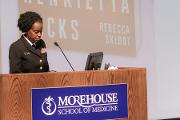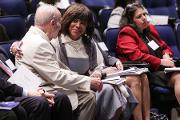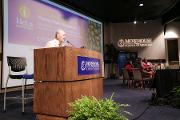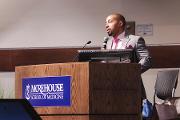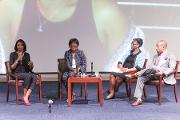‘That Should Not Lead to Death’: MSM Partners with March of Dimes to Find a Way to End Maternal Mortality
The birth of a baby is supposed to be a time filled with joy.
But for an Atlanta father and a grandmother, what was supposed to be the happiest days of their lives, turned tragic.
Charles Johnson and his wife Kira were expecting their second child. Ahead of their new son’s arrival, they sought out the best. They had the best health insurance. They went to Cedar Sinai, one of the best hospitals in the nation. Kira was young, healthy, and vibrant. However, just hours after celebrating the birth of their son Langston, they were mourning the death of the mother Kira.
Wanda Irving was looking forward to the birth of her grandchild. Shalon Irving was 36 years old, had earned several degrees, and was an accomplished epidemiologist at the Centers for Disease Control and Prevention. She gave birth to a baby girl, Soleil. A week later, the first-time mother was declared brain dead. Her devastated parents had to make the difficult decision to terminate care.
They shared their stories with more than 400 medical professionals, scientists, and community advocates at Morehouse School of Medicine’s 23rd Annual HeLa Women’s Health Symposium, sponsored by the March of Dimes. Each year, health leaders gather to examine issues affecting women’s health, in honor of Henrietta Lacks. This time, they came together to devise solutions to the national crisis of maternal mortality, so that there would not be any more stories like Johnson’s or Irving’s.
“You will hear the staggering statistics that African-American women are 243 percent more likely to die due to complications with pregnancy or childbirth,” said Valerie Montgomery Rice, M.D., president and dean at MSM. “In the 21st century with disruptive innovation in clinical care, this is an opportunity for us to change this narrative by forging a path that leads to health equity.”
According to Johnson, a medical mistake that could have been resolved quickly and easily, lead to the death of his wife and the mother of his children. He noticed blood in Kira’s IV and immediately called for the doctor. The couple waited for hours and hours until Kira was finally taken into surgery. She died shortly after surgeons began operating on her.
“That should not lead to death at Cedar Sinai,” said Johnson to the audience. “Had they taken action earlier, Kira would be here.”
Now, Johnson is raising his two young boys alone. Trying to do his best every day in honor of the woman he promised to love until death do them part.
“When an 18-month-old says to you ‘Where’s my mommy?’ and you say, ‘Your mommy is in heaven’ and he says ‘Well, I want to go to heaven too,’” shared Johnson about his son Langston, all the while trying to hold back his own tears.
Since his wife’s passing, Johnson founded 4Kira4Moms and has become an outspoken advocate for improving maternal mortality rates.
“Doctors need to realize we know our body better than anyone,” said Irving.
Irving’s daughter realized something was not right after she gave birth to Soleil. Shalon noticed she was gaining a lot of weight in just one week, she was bloated, and she was not urinating even though she drank plenty of water. But when she told her doctors and nurses about her concerns, she received unexpected responses.
“She would get condescending comments,” said Shalon’s mother. “They would tell her don’t worry about it. Go home. Things will get better. Give it time.”
Days later, Shalon was gone. And her mother took on the responsibility of raising her newborn granddaughter Soleil.
“The hardest part is realizing that my daughter didn’t have to die,” said Irving encouraging others to be vocal and proactive about their conditions. “Sometimes, my granddaughter will ask ‘Where is my mommy? Why can’t she be here? It’s times like these that make you want to curl up and die yourself.”
Some might say Sherri Kinard was lucky. She survived her life-threatening complications. But it has left a lasting impact on her life.
Kinard was a healthy and active 27-year-old woman. When she was 26 weeks pregnant, she went to the hospital for what she thought would be a somewhat minor issue. She did not expect to be rushed into delivery and give birth to her son prematurely naturally. Everything seemed good and healthy with the new mother and her baby. Then she started to realize something wasn’t right.
“My ankles swelled up to the size of my thighs,” said Kinard. She also had trouble leaning back in the bathtub and could only sit in a forward position. Kinard called for her husband, and he took her to the hospital.
Kinard went through test after test after test. Doctors learned her heart was just barely functioning. She suffered heart failure due to childbirth.
She and her husband had dreamed of having a second child, but that would not be. Doctors explained to the couple the risk of having more children.
“That was one of the worst messages I ever received,” recalled Kinard. That you cannot have more kids because next time you will not make it.”
“When moms and babies are dying, we need to change what we are doing, and do it in a big way,” said Stacey Stewart, president of the March of Dimes. “We need blanket change. And the only way that will happen is if we take what we learn at gatherings like this one and push for that kind of change.”





